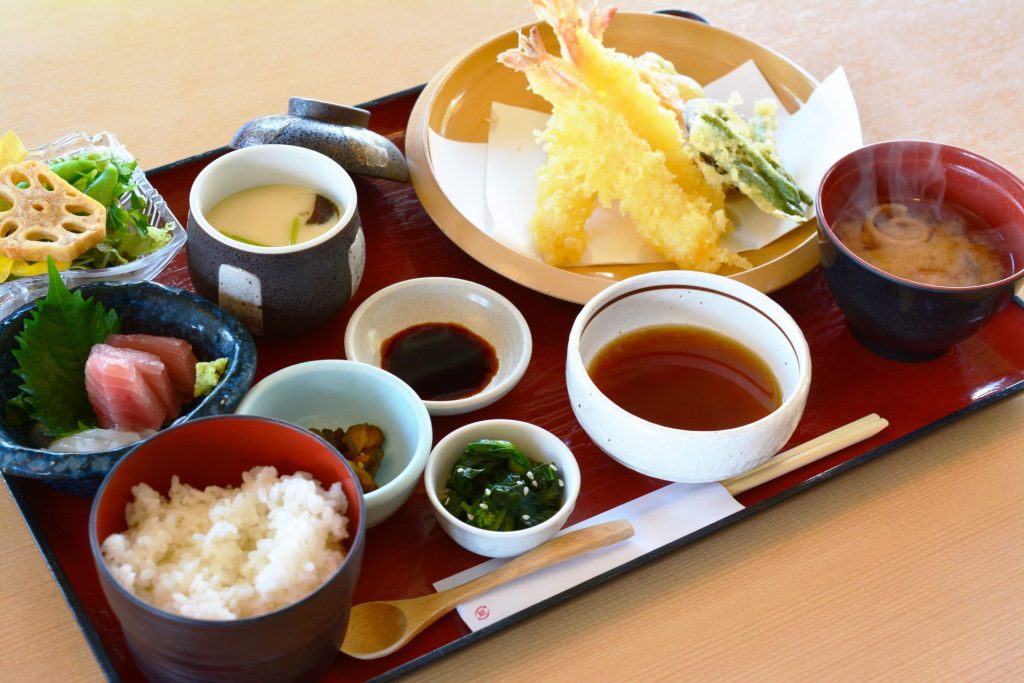
The Japanese say Itadakimasu (いただきます) before a meal and Gochisōsama (ごちそうさま) after a meal without fail, but why? Parents tell their children to say these two expressions before and after the meal without fail, but why?
Where does itadakimasu (いただきます) come from?
Itadakimasu (いただきます) is the polite form of the verb itadaku (いただく) and the humble form of the verb morau (もらう) meaning to receive. Its polite form is moraimasu (もらいます). It used to mean “to receive something in the position above one’s head” to show one’s gratitude in receiving something precious by raising both hands above one’s head. Consequently, the objects of gratitude stretch to life in general, food materials and ingredients and those who produce them, those who raise animals and who catch seafood, those who manufacture cooking utensils and even to those who cook the meals. The gratitude to all these things and people is condensed to this one word, itadakimasu, before the meal. Parents tell children that they should thank all those things and people, because we cannot eat our meals without them.
Where does gochisōsama (ごちそうさま) come from?
Gochisōsama (ごちそうさま) consists of three words. “Chisō” (馳走) literally means “run around”. This is referring to the ones who cook meals for you have been busy running around to collect the ingredients and to cook the dishes in the kitchen. “Go” (御) is a polite prefix to make the following word polite and “sama” (様) is a polite suffix to make the preceding word polite, too. Therefore, the literal meaning of this expression is “I sincerely thank you very much for your running around to have prepared and made these dishes for me” and people say this after each meal. Once again, parents tell their children that we should thank all those who were involved in cooking the meal.
Itadakimasu and Gochisōsama as manifestations of “a culture of gratitude”
As explained above, one of the characteristics of Japanese culture is “a culture of gratitude”. The Japanese know that they cannot survive by themselves without relying upon other people. So, parents try to tell their children to say Itadakimasu and Gochisōsama before and after each meal to thank those who produce vegetables and fruit, raise the animals, catch the fish and other seafood, deliver these ingredients, process them and so on. Children don’t know what these two expressions mean at first, but as they grow up, they start to understand why they are saying them.
Replies to Itadakimasu and Gochisōsama
When you are cooking or you are the host of the meal and you hear Itadakimasu, what should you say? You simply reply, “Dōzo”(どうぞ please) or “O-matase shimashita.” (お待たせしました。I’m sorry to have kept you waiting.)
What about when you are cooking or you are the host of the meal and you hear Gochisōsama, what should you say? The standard reply is “O-somatsu-sama deshita.” (お粗末さまでした。I’m sorry about the poor quality meal. / It’s nothing special, but I hope you enjoy it.)
Gochisōsama after being treated
Gochisōsama is also often used when you are treated by someone at her/his house, at restaurants, pubs and other eateries to express your gratitude.
Itadakimasu used in a different meaning
Itadakimasu could be used in a totally different context. When you are exhausted in trying to come up with an idea and find someone else’s suggestion attractive, you could say itadakimasu to that person to “steal or borrow” the idea. For example,
「この部分の大きさと色を変えてみたらどうだろうか。(Kono bubun no ookisa to iro o kaete mitara dōdarō ka.)」“How about changing this part to a different size and colour?”
「あ、それはうまくいきそう。その考え、いただきます。(A, sore wa umaku ikisō. Sono kangae itadakimasu.)」“Wow, that might work. I’ll borrow your idea and re-make it.”
Gochisōsama used in a different meaning
Likewise, gochisōsama could be used in a totally different situation. When someone is telling you that she/he is infatuated with someone else and you cannot listen to such talk any more, you tell her/him, “that’s enough sugar for today! ; stop, I’m getting cavities!”.
For example,
「もう、この人の目を見ているだけで、ドキドキしてしまうの!(Mō, kono hito no me o miteiru dakede, dokidoki shite shimau no!)」”My heart beats fast when I look at his eyes!”
「あら、ごちそうさま!? “Ara, gochisōsama!?」”Get a room, will you?”
Author
Shunichi Ikeda
BAS Hons (ANU)
MEd (SUNY at Buffalo)
Visiting Fellow, ANU College of Asia and the Pacific












